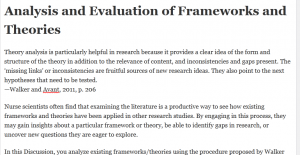Analysis and Evaluation of Frameworks and Theories

Theory analysis is particularly helpful in research because it provides a clear idea of the form and structure of the theory in addition to the relevance of content, and inconsistencies and gaps present. The ‘missing links’ or inconsistencies are fruitful sources of new research ideas. They also point to the next hypotheses that need to be tested.
—Walker and Avant, 2011, p. 206
Nurse scientists often find that examining the literature is a productive way to see how existing frameworks and theories have been applied in other research studies. By engaging in this process, they may gain insights about a particular framework or theory, be able to identify gaps in research, or uncover new questions they are eager to explore.
In this Discussion, you analyze existing frameworks/theories using the procedure proposed by Walker and Avant. Your analysis should provide an objective understanding of the strengths and weaknesses of each framework or theory. This, in turn, should enable you to evaluate whether the framework/theory is useful for the purposes of your theoretical foundation for a program of research.
To prepare
- Review the information that Dr. Hathaway presents in the Week 1 media program, “Theoretical Foundation for Research,” regarding the phases of theory development and the similarities and differences between frameworks and theories.
- Search the literature and identify two frameworks/theories that may be useful for investigating your phenomenon of interest.
- Review the procedure for theory analysis presented in Chapter 12 of Walker and Avant (2011). Apply these steps to each framework/theory you have selected and identify the strengths and weaknesses of each framework/theory. Determine whether additional development or refinement is needed (i.e., for each framework, identify which aspects would require further research in order for it to meet the requirements of a theory).
- Evaluate the value of each framework/theory for addressing your phenomenon. Determine which framework/theory has the most potential for use as part of your theoretical foundation of your research.
- Think about any questions you have related to theory analysis and evaluation.
By Day 3
Post a description of the two frameworks/theories you analyzed and evaluated, and explain why each is considered either a framework or a theory. For framework(s) you have selected, explain which aspects would require further research to meet the requirements of a theory. Explain why one has the most potential for use in your theoretical foundation for research, noting its strengths and weaknesses. Also pose any questions that have arisen through your examination of frameworks/theories.